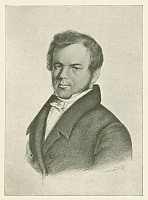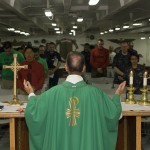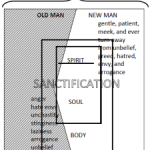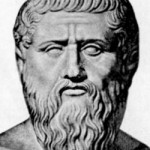From The Doctrine of the Person and Work of Christ, by Ernst Sartorius…coming very soon!
 In our last Lecture we finished the consideration of the doctrine of Scripture respecting the Person of Christ. We now proceed to inquire what is taught in the Inspired Volume respecting the Work of Christ, or the purpose for which He became incarnate. The latter depends so entirely on the former, being as intimately connected with it as the branch with the stem, that in the representation we gave of the extraordinary constitution of Christ’s person, we necessarily adverted to the object which it was designed to accomplish. If we attentively survey the delineation of the two natures of the Mediator, their union and the various steps of His humiliation and exaltation, and seriously consider the impression which the whole is fitted to make, we shall be convinced that the object and aim of His work is to effect a most intimate connection and communion between the Divinity and the human race, by which the love of God is to be gloriously displayed and the welfare and salvation of man established on an immoveable basis. The welfare of man as a rational, spiritual being is founded on the love of God and communion with Him.
In our last Lecture we finished the consideration of the doctrine of Scripture respecting the Person of Christ. We now proceed to inquire what is taught in the Inspired Volume respecting the Work of Christ, or the purpose for which He became incarnate. The latter depends so entirely on the former, being as intimately connected with it as the branch with the stem, that in the representation we gave of the extraordinary constitution of Christ’s person, we necessarily adverted to the object which it was designed to accomplish. If we attentively survey the delineation of the two natures of the Mediator, their union and the various steps of His humiliation and exaltation, and seriously consider the impression which the whole is fitted to make, we shall be convinced that the object and aim of His work is to effect a most intimate connection and communion between the Divinity and the human race, by which the love of God is to be gloriously displayed and the welfare and salvation of man established on an immoveable basis. The welfare of man as a rational, spiritual being is founded on the love of God and communion with Him.
The highest, essential point of superiority in man, above the irrational creation, consists in this: that he is capable of religion, that he knows God and His law, that he is created for the purpose of resembling and loving his Maker. In other properties the higher orders of animals, though not equal, are similar to man; the difference between them, though great, is only in degree. But of religion, as a self-conscious relation to God and the spiritual world, no trace can be found in the brute creation. Religion, the sacred band which unites man in spontaneous love to the Almighty Lord of the universe, makes man also the lord of the terrestrial creation. His physical strength, cunning, and prudence do not give him this pre-eminence, or if they do, it is at most only in reference to external objects; for supposing that he controls at his pleasure the inferior animals, his heart may all the while be enslaved by an attachment to some other created object, either to money and worldly possessions, or sensual indulgence, or splendor, or perhaps to one of his fellow-mortals. Faith and love alone set the heart free from bondage to the creature, and enable man to control it instead of being controlled by it; they calm the soul, release it from the slavery of the passions, and elevate the whole man above the fettering influence of the changeable and perishable to the unchangeable and eternal.
Religion, as the bond which connects man, the offspring of time, with the eternal, immortal God, is the basis of his immortality, which the temporal and changeable creature enjoys not as its own prerogative, but solely through its connection with the eternal and unchangeable. Religion is the proper destiny, the true happiness of man; it is the end of his creation; hence it is said, “Let us make man in Our Own likeness, and let them have dominion over all the earth” (Gen. 1:26). The image of God in man, or his likeness to God, is nothing else than religion—the connection or relationship of man with God—in consequence of which the light of Divine knowledge shines in his reason, his will acts in harmony with the Divine will, and his heart is governed by the affection of Divine love. To bear the image of God, by means of religion, was the destination of man, the design of his creation. Nor while this constitutes his supreme end, is any useful mode of activity in concerns relating to the present world, excluded—on the contrary: religion gives to all the diversified forms of human ability, which are, be it remembered, the gifts and endowments of the Creator, their genuine consecration, the purest motives, and the highest aim, and imparts to human agency a moral proportion, order, and harmony by which the Divine image is brought out in luster and beauty.
And as religion is the highest duty of man, so also it constitutes his happiness. The essence of happiness, as well as of religion, consists in the love of God; by which we mean, not merely our love to God, but more especially the love of God to us, and which we appropriate to ourselves by faith. God is in himself the highest perfection and happiness, the supreme good, and the source of all inferior good. Our highest good is, when God is for us, that is, when he loves us. The love of God to us is not only in itself our highest happiness and enjoyment, but it is also the only fountain of all that is good and felicitous, of all that can afford content and satisfaction, either in this world or the next. It is not an inactive principle, but is operating continually for our good; here on earth it bestows many precious gifts, and if we continue in it, will bestow still greater and more magnificent gifts in heaven. But the love of God is of far greater value than the gifts it dispenses; it is the essence of our happiness; and without it, all the riches of heaven would not make us happy; for we should still want the best, the highest good. For the same reason no accumulation of earthly good can make those persons happy who have not the love and peace of God, and to whom therefore real satisfaction is wanting.
+SDG+










